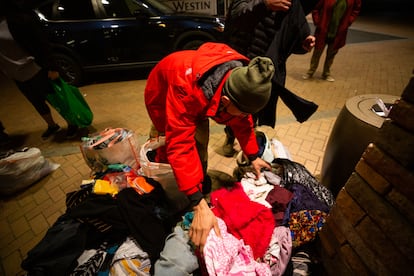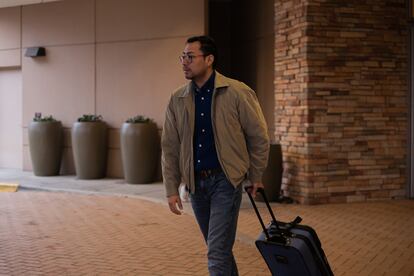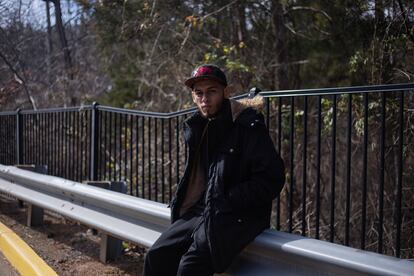Seeking homes and stability, exiled Nicaraguans face tenuous futures in the US
The 222 political prisoners come from all walks of life but share a common sentiment: ‘Anyone who loves their family doesn’t want this’


Yubrank Suazo still has trouble sleeping. It has been 15 days since the Ortega-Murillo regime kicked him and 221 other political prisoners out of the country, putting them on a charter flight to Virginia in the US. The first days of “freedom,” as they call it, were “incredible.” The flood of emotions and the lingering trauma of the torture they suffered in prison robbed them of sleep. Weeks later, the social activist from Masaya, in western Nicaragua, sleeps better but is still anxious about his uncertain future in a country where he doesn’t speak the language. How long will he be able to stay with his friends in Miami?
“It has been truly traumatic,” Suazo tells EL PAÍS outside St. Agatha’s Church in Miami, where he and other exiled prisoners had just heard Bishop Silvio Báez preach. Báez is another Nicaraguan who was stripped of his citizenship by the regime. “President Joe Biden, the US government and the Nicaraguan community here supported us when we arrived, but now we must make some decisions. I must get past this grief to have the clarity I need to develop a new life plan. I’m starting from scratch again, and I want to be at my best emotionally,” says Suazo, whose voice falters when he thinks about his hometown, one of the centers of the 2018 social protests in Nicaragua.

Suazo has to reinvent himself again. The last time he did so was in 2018 when a Sandinista paramilitary group set fire to his family’s home in Masaya and threw him in prison. That was a tough time, but he thinks remaking his life in the United States will be even more challenging.
“I have been imprisoned twice and spent time in solitary confinement. But leaving my home, parents, family, friends and environment is even more painful and traumatic,” he says. His environment was Masaya, the “capital of Nicaraguan folklore,” where the family business made manila-fiber hammocks. After being released from prison in July 2019, he decided to use the manila fiber he knew so well to make women’s handbags.
“Will I be able to do that in the United States?” he wonders out loud. His priority now is to find somewhere to live that isn’t a temporary shelter, preferably a place he can rent on his own.
“Every political prisoner has the same priorities – finding stability and a home. Many of us don’t have a fixed address to register with Parole authorities,” says Suazo, referring to the Biden administration’s program that allows foreigners to enter and stay in the US for compelling emergencies and urgent humanitarian reasons.
The 222 Nicaraguan exiles are now scattered all over the United States. According to the US State Department, Florida (specifically Miami) has the most (67), followed by California (22), Maryland (36) and Virginia (14). The rest are in other places.
People who, unlike Suazo, have no relatives or friends in the US to take them in, have been placed with foster families by various NGOs. But they can’t stay indefinitely. Gabriel Eliseo Sequeira and others released from Nicaragua’s La Modelo prison will live for three months in a small apartment in California until they are issued work permits and can pay rent elsewhere.

A softer landing
In Miami, a handful of exiled Catholic clergy – priests, seminarians and deacons – live in an apartment offered by a Nicaraguan family. The house has all the basics and mattresses to sleep on. They receive donations from the Nicaraguan community in the US and hope to have a clearer sense of direction in the coming months. But it’s the ordinary people facing the most uncertainty; the ones who were arrested for protesting in the streets. They don’t know anyone in the US; many had never been on an airplane before the flight into exile.
The more well-known political exiles don’t have it easy but should experience softer landings in the US. Some family members have lived in the United States for decades and took in their relatives immediately. Businesspeople can more easily afford to pay rent, and English speakers will be able to adapt more quickly.
The 222 political prisoners come from diverse social and economic strata. For example, Félix Maradiaga and Juan Sebastián Chamorro already have homes in the US. A few years ago, their wives, Berta Valle and Victoria Cárdenas, were accused of treason and sought asylum in the United States. A roof over their heads and stability means they can continue their activism in exile and work for a living.
“Let me tell you,” says Denis García Jirón, a veterinarian from Managua. “Anyone who loves their family doesn’t want this. We, the political prisoners, have all suffered whether or not we have homes here. We don’t want this. We left behind parents, children, wives, aunts and uncles, and brothers and sisters who love us, and we love them. Now we must make a life here – that’s the hand we’ve been dealt.”
Sign up for our weekly newsletter to get more English-language news coverage from EL PAÍS USA Edition
Tu suscripción se está usando en otro dispositivo
¿Quieres añadir otro usuario a tu suscripción?
Si continúas leyendo en este dispositivo, no se podrá leer en el otro.
FlechaTu suscripción se está usando en otro dispositivo y solo puedes acceder a EL PAÍS desde un dispositivo a la vez.
Si quieres compartir tu cuenta, cambia tu suscripción a la modalidad Premium, así podrás añadir otro usuario. Cada uno accederá con su propia cuenta de email, lo que os permitirá personalizar vuestra experiencia en EL PAÍS.
¿Tienes una suscripción de empresa? Accede aquí para contratar más cuentas.
En el caso de no saber quién está usando tu cuenta, te recomendamos cambiar tu contraseña aquí.
Si decides continuar compartiendo tu cuenta, este mensaje se mostrará en tu dispositivo y en el de la otra persona que está usando tu cuenta de forma indefinida, afectando a tu experiencia de lectura. Puedes consultar aquí los términos y condiciones de la suscripción digital.








































